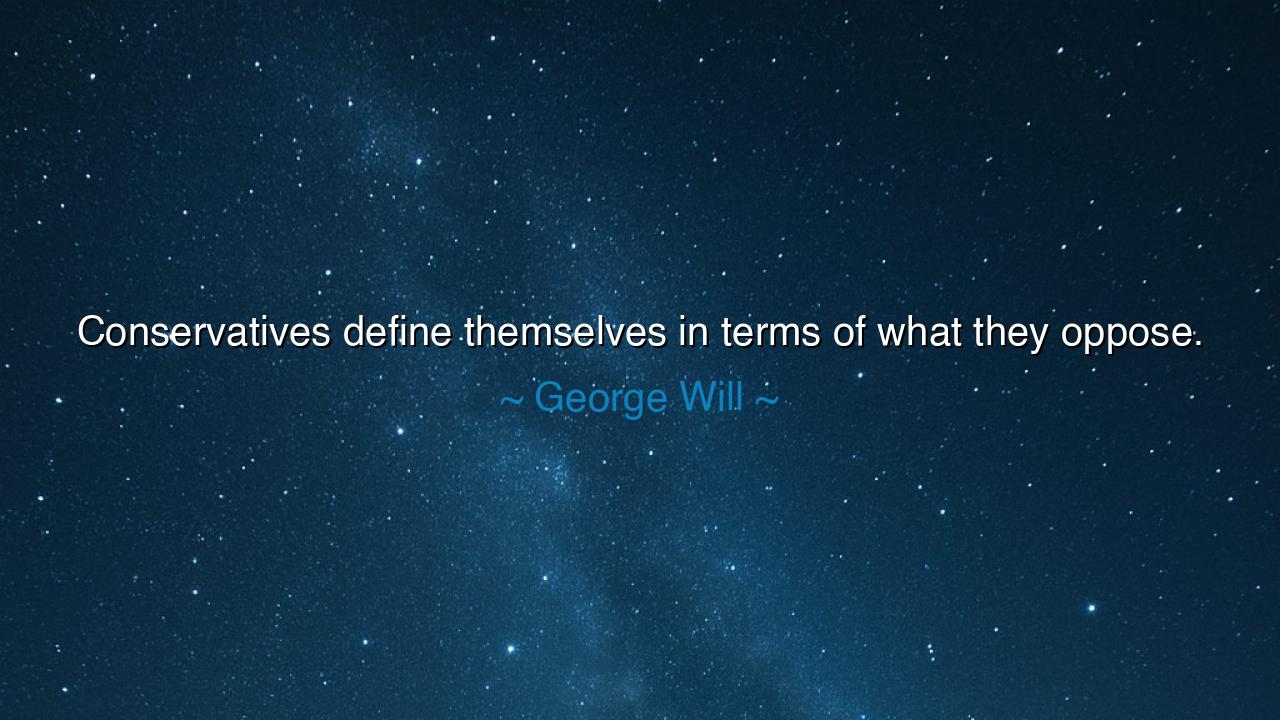
Conservatives define themselves in terms of what they oppose.






The words of George Will — “Conservatives define themselves in terms of what they oppose.” — fall with the weight of observation sharpened by long years of study. A man of letters and a thinker of politics, Will saw that the identity of the conservative is often not drawn first from what they seek to build, but from what they resist. Their power lies not always in visions of new dawns, but in the guarding of old walls, the defense of traditions, and the refusal to yield to change they deem dangerous.
The meaning is layered and profound. To oppose is not merely to resist blindly, but to draw a line in the sand. For the conservative, this line is often drawn against the tide of reform, revolution, or novelty. In this way, opposition becomes not just an act but an identity. Their creed is formed in the battles they fight — against radicalism, against upheaval, against those who would sweep away the inherited wisdom of ages. Thus Will speaks a truth that is as much descriptive as it is critical: that the strength of conservatives is found in their “no” rather than their “yes.”
History bears witness to this. In the wake of the French Revolution, when the monarchy fell and blood ran in the streets, conservatives across Europe rallied not around grand visions of new futures, but around opposition — opposition to chaos, to mob rule, to the dismantling of Church and Crown. Edmund Burke, the great voice of conservatism, did not dream of remaking the world anew, but warned instead of the dangers of tearing down what centuries had built. His power lay in resistance, in saying this far, no further.
And yet, opposition can both preserve and suffocate. In the United States, conservatives in the mid-twentieth century often opposed civil rights reforms, claiming they moved too quickly, that they disrupted order. Here, their opposition revealed not wisdom but fear, and their identity was bound to resistance that history judged harshly. Will’s words remind us that defining oneself only by what one opposes can become a prison, for in clinging too tightly to the past, one may fail to embrace justice and progress when they arrive.
Let this wisdom echo to the generations: opposition has its place, for it preserves the wisdom of ancestors and shields against reckless haste. But the identity of a people, or a movement, must not rest solely in “no.” True greatness is found not only in resisting what must be resisted, but in building what must endure. George Will’s words, spoken with insight, remind us of the delicate balance — to honor the role of conservatives as guardians, yet to see that those who define themselves only by opposition risk being remembered not as builders of nations, but as shadows against the light of change.






B7Phan Quang Bach 7/1
George Will’s observation about conservatives is quite revealing. It implies that, instead of offering a proactive vision, many conservatives spend their time opposing new ideas. But does this focus on opposition lead to missed opportunities for constructive dialogue? How can conservatives balance the need to preserve tradition with the necessity of addressing new societal challenges and embracing necessary reforms?
THNguyen thu hang
The idea that conservatives define themselves by what they oppose speaks to the reactionary nature of many political movements. But is this inherently bad? Could there be value in opposition as a way of preserving what is valuable in society? Or, does it ultimately leave little room for innovation and adaptation? How do conservatives navigate this challenge without losing their relevance in an evolving political landscape?
PTDang Phuong Thao
George Will's quote seems to suggest that conservatism, in its essence, is driven by resistance. But isn’t that a bit limiting? It’s one thing to oppose something, but how can conservatives offer a compelling vision for the future if their identity is rooted in opposition? Is there a possibility that conservatives are too focused on the past or on rejecting modernity, rather than embracing future possibilities?
VTVu Van Thanh
The idea that conservatives define themselves by opposition is intriguing but raises the question of whether all political ideologies fall into this trap. Do liberals, for example, often define themselves solely by what they oppose? In both cases, is there a risk of being more focused on the 'enemy' than on creating a positive vision for the future? How can any ideology evolve to be more inclusive and less reactive?
JJJdjdjrj Jdj
It seems like George Will is commenting on how conservatives often position themselves by reacting to change, rather than actively shaping it. But does this tendency hinder progress? If conservatives are mostly concerned with what they oppose, does this lead to a stagnant political discourse, where solutions take a back seat to opposition? Can conservatives adapt to new challenges without losing their ideological grounding?